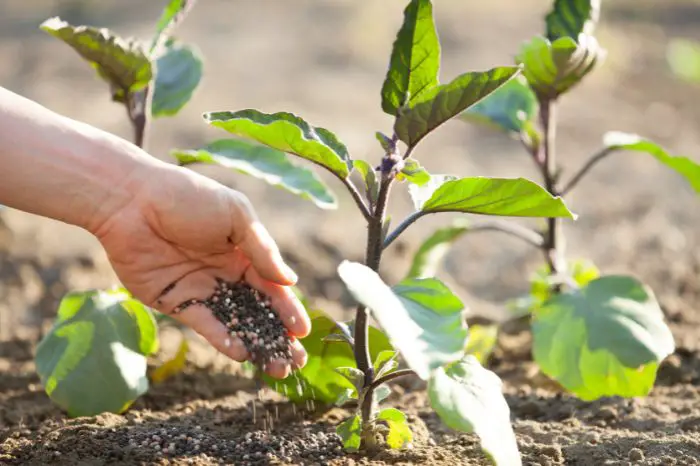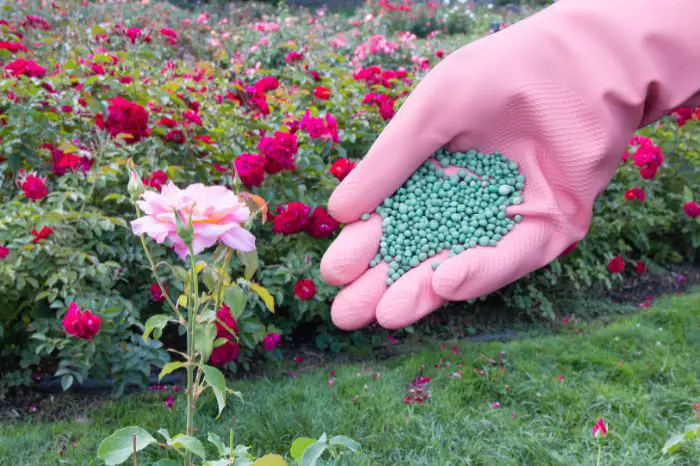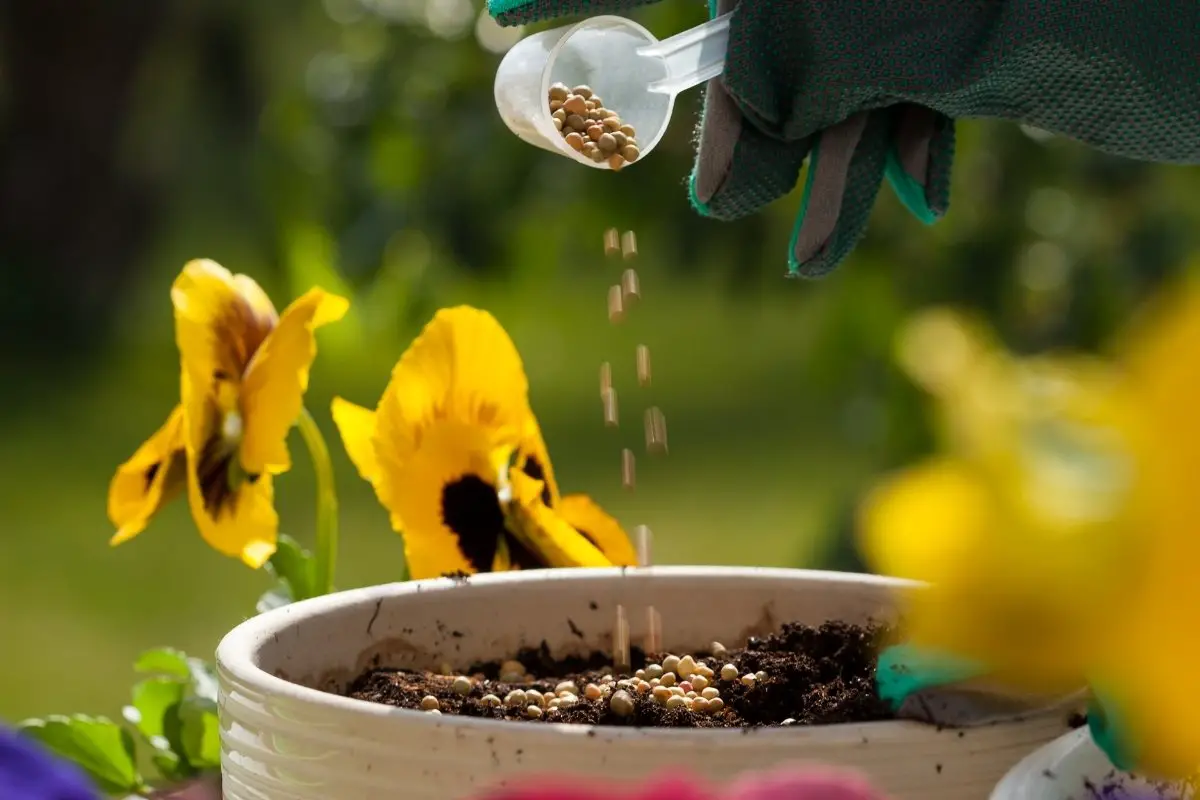Last Updated on October 16, 2022 by Cristina
If you’re wondering: Can You Use Vegetable Fertilizer On Flowers? Well, you’re in the right place! Vegetable fertilizers aren’t limited to crops, although their name suggests it.
Whether you’ve stocked up on veggie fertilizer or want to make your own fertilizer from vegetables, knowing where to best use it will help you keep anything you grow healthy. In this article, I explain what vegetable fertilizers are and share where you can safely use them.
What Are Vegetable Fertilizers?
Vegetable fertilizer is available as a compost mix, misting spray, and liquid. The best ones contain nitrogen, phosphorus, potassium, copper, iron, manganese, and zinc.
Depending on your crops, you should use varying amounts of fertilizers containing these nutrients to help your veggies grow well and produce a bigger harvest. Adding too little or too much of a specific nutrient could alter your crop health, so ensure you know what’ll work best for your garden.
Soil typically contains all the nutrients your vegetables need to grow except nitrogen and phosphorus. A soil test will help you determine what your soil needs.

Can You Use Vegetable Fertilizer On Flowers?
Vegetable fertilizers will promote healthy growth in flowers. When choosing store-bought fertilizers, you’ll have to keep an eye on their NPK ratio. The specific nitrogen, phosphorus, and potassium levels in each vegetable fertilizer will indicate which flowers they are best used on.
Most veggie fertilizers will be balanced with a 10-10-10 ratio, but some may contain more phosphorus to accommodate the vegetables that need higher levels. Adding too much phosphorus to the soil around your plants could prevent healthy bacterial and organism growth. This fungus helps plants root, and inhibiting its growth will force plants to use their resources for healthy root development at the expense of other parts.
If you want to use vegetable fertilizer on flowers, ensure your soil is tested to determine which nutrients it lacks. Purchase a veggie fertilizer that can add the minerals your flowers need.
Click Here to Get Info About:
- Why Is My Snake Plant Growing Out And Not Up? Quick Fixes!
- Aloe Vera Leaves Thin And Curling: Reasons And Solutions!
Making Your Own Flower Fertilizer From Vegetables
Instead of buying vegetable fertilizer, you can make organic fertilizer for your plants from vegetables! You can compost any vegetable scraps in a few easy steps. There are different ways to do this, but the two most common methods are referred to as cold and hot composting.
Cold Composting: Place vegetable peels and scraps in a bin and wait for the material to decompose. This is a lengthy process and can take up to a year. You can keep topping your compost pile up until your container is full. There’s no need to turn your heap, and microorganisms will do all the work for you.
Tiyafuro 2.4 Gallon Kitchen Compost Bin for Counter Top or Under Sink
Hot Composting: This method delivers faster results and requires some gardening experience. To create fertilizer with this process, you’ll have to mix high-nitrogen materials with your veggie scraps. This will heat your pile to speed decomposition up. You should also keep your compost heap damp at all times for this method to work.
You can use the decomposed material as fertilizer for your plants or veggie garden. Mixing it in the soil is a great idea, although you can sprinkle it on top too.
Check Out Why Are My Spider Plant Leaves Curling? Here’s The Answer!
Can You Use Tomato Fertilizer For Flowers?
If you want your summer blooms to last even longer, consider feeding them tomato fertilizer. The nutrients in these fertilizers can keep your flower garden colorful for a few more weeks than usual. You can use tomato fertilizer on different kinds of plants. Although plants create their own food through photosynthesis, they still take nutrients from the soil.
Tomato fertilizer contains high levels of nitrogen that promote leaf growth. The phosphorus in it encourages root growth. If you add this fertilizer to your beds at the beginning of the season and again a few weeks in, your plants will continue to bloom healthily.
Can I Use Tomato Fertilizer On Roses?
Cosmos, dahlias, sunflowers, and roses are some plants that thrive on tomato fertilizer. Roses especially need high amounts of potassium, and tomato fertilizer brings a healthy dose!
Potassium encourages strong root growth and bigger blooms. It also keeps roses roses healthy by preventing diseases. Without this mineral, roses have a harder time taking in more water. You can use tomato feed on different rose types, including the climbing varieties and hybrids.

Which Fertilizer Is Best For Flowering Plants?
Flowering plants are perfect if you want to add color to your backyard. Using a good fertilizer can keep your blooms on display well into the colder months.
There are many types of plant fertilizer, and choosing the right one for your flowering plants is best done through trial and error. You can choose between liquid mixes or fertilizers that are easy to sprinkle around your plants.
The best fertilizer for flowering plants will contain lots of phosphates to promote strong root and flower growth. If you’re planting seedlings, look for one with good soil bacteria to help develop baby plants.
Slow-release fertilizers also work better for flowering plants. These formulas gradually release fertilizer into the soil around your plants, so you don’t need to. It ensures lush blooms for months!
Take Out Time to Also Read:
Can You Use Plant Fertilizer On Flowers?
General plant fertilizers work great for flowers if it contains the three most necessary minerals: nitrogen, phosphorus, and potassium.
Flowers need nitrogen during photosynthesis to develop green leaves. This mineral should present in the largest amount. If you’re planting from seed, the right amount of nitrogen will also ensure healthy germination. Phosphorus and potassium will aid in healthy bloom and root system development.
Most all-purpose fertilizers contain reasonable amounts of each mineral, but you might need specific ratios for your flowering plants.
In Conclusion, Can You Use Vegetable Fertilizer On Flowers?
Vegetable fertilizers aren’t limited to veggies. You can use them on many different flowers for stunning results! If you choose one with the right composition, your flowers will thrive.
I hope this article was helpful. If you have more questions about using vegetable fertilizers on flowers, ask them in the comment section!



